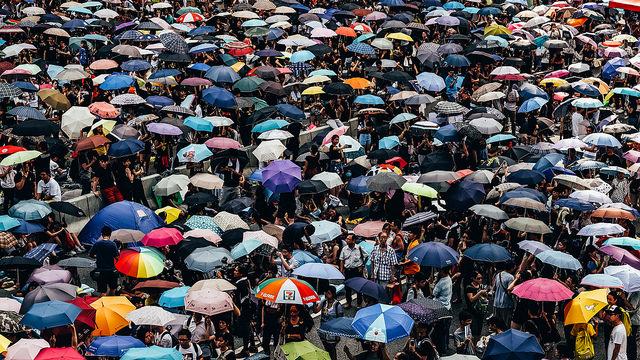World at a Glance: ISIS, Ebola, Hong Kong Protests
Pro-Democracy protesters filled the streets in Hong Kong in peaceful protest of Beijing’s power grab.
October 6, 2014
For the grand opening of the La Salle Falconer website, a news series called World at a Glance makes its debut. World at a Glance is a column discussing major world events on a weekly basis.
ISIS Drags U.S. Back to Iraq
By the end of 2011, all U.S. troops had been removed from Iraq following a plan for a reduction in U.S. Military presence in Iraq. In the absence of American armor and the presence of a unprepared Iraqi military, a group known as ISIS (Islamic State of Iraq and Syria) has filled the void the U.S. left.
In response, President Obama addressed the nation on September 10 describing ISIS as a terrorist organization and declaring war upon it. Few specific details were given about the military action against ISIS other than no troops would return to Iraq and that only air strikes would be used. President Obama also called on other nations and allies to aid the U.S. in the fight against ISIS. As of October 1, 306 air strikes have been conducted by the U.S. against ISIS, 230 in Iraq and 76 in Syria. The U.S. has been targeting strategic targets such as oil refineries that ISIS controls and uses as revenue and vehicles they use. These strikes however are not having the impact necessary to slow down the march of ISIS.
Ebola’s Advance Halted by Stronger Health Care Systems
The spread of Ebola has been well covered and publicized, creating fear and concern in even the most developed countries. The United States just treated their very first Ebola patient in Dallas, TX but many are fearful that more Americans will be infected. Ebola is a disease that is spread through bodily fluids like saliva, blood, and vomit and can be killed with disinfectant and bleach.
The danger of Ebola is real but, perhaps, over exaggerated and out of proportion. Ebola has spread quickly in poor countries like Sierra Leone, Nigeria, Liberia, and Guinea which all have poor health care systems. In countries with better funded systems, the disease has been stopped cold. The difference in health care spending between these nations and countries like the U.S. is staggering. On average, Guinea spends $32 per-person, Liberia spends $65 per-person, and Nigeria spends $94 per-person every year. In sharp contrast to these figures, the United States spends $8,895 per-person every year.
One reason why the disease spreads more easily in Africa than in more developed countries is the different burial practices. In many nations in Africa, the family of the victim will gather around to touch, wash, and kiss the body of their loved one. This is especially dangerous since the virus is most contagious after the victim has died. The W.H.O. (World Health Organization) is trying to educate
Pro-Democracy Protests Fill Hong Kong
Peaceful protests broke out in Hong Kong after Chinese leaders in Beijing decided to allow Hong Kong to vote on their chief executive in the 2017 Elections only after tight restrictions are imposed on which candidates can run and after a committee in Beijing approves the candidate. Tens of thousands of Pro-Democracy protesters lined the streets in Hong Kong and remain there even after cease and desist orders are issued from Leung Chun-ying, Hong Kong’s Chief Executive. Police have threatened to crack down on protesters and have previously used pepper spray against them.
The Pro-Democracy protesters have asked for the resignation of Chun-ying, which he has refused, as they see him as an extension of Beijing’s power and influence. Chun-ying was elected in 2012 with 689 of the 1,200 votes by the electoral college made up of mostly pro-Beijing lawmakers. His approval rating now sits at a low 21% and 61% of those in a survey say they have no confidence in his ability to lead Hong Kong.
Photo Source: https://www.flickr.com/photos/justinlim/15223442628





